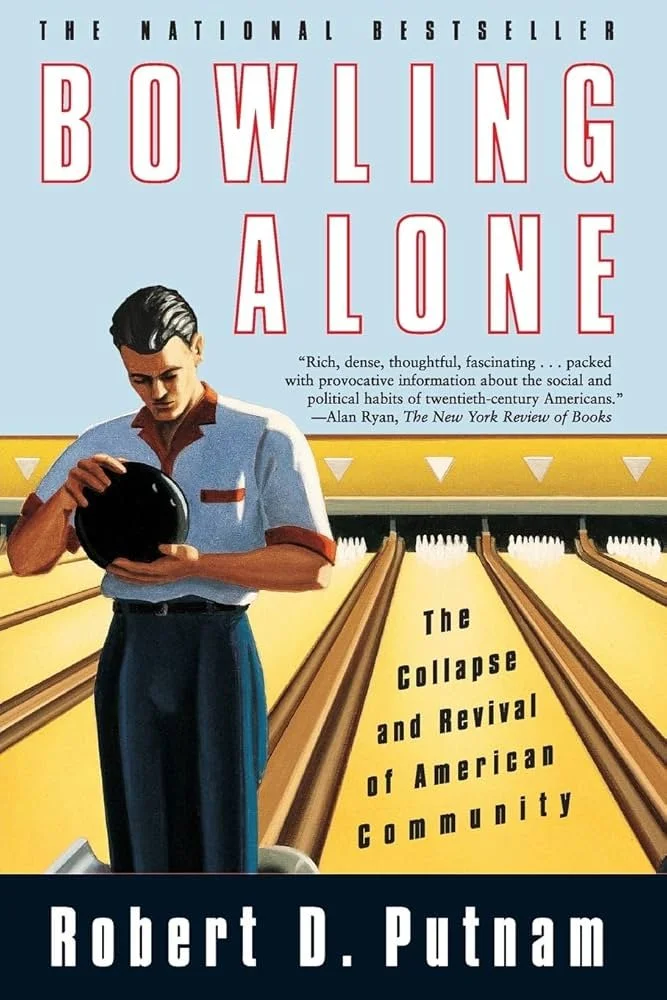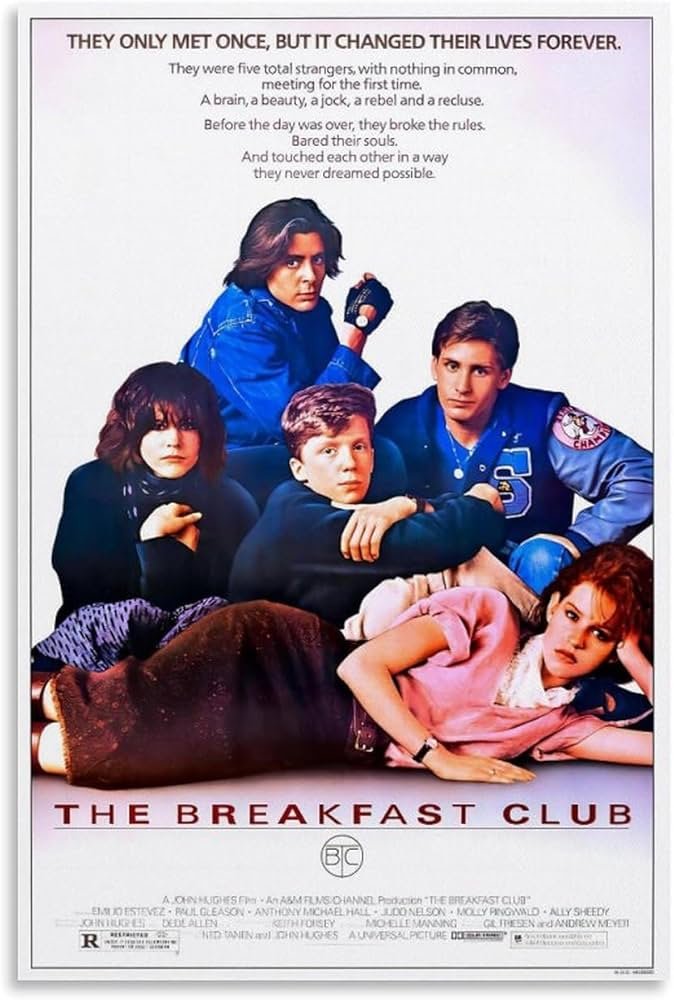Bowling Alone: Finding Community in an Age of Isolation
Critical Engagements 2025–2026
Americans have been famous since de Tocqueville for getting together on purpose. Not so long ago we still bowled together, in leagues we formed ourselves. Places of worship bustled on weekends and Wednesdays. Civic clubs organized pancake breakfasts, fixed the playgrounds, and taught us our neighbors’ names, beliefs, and pastimes—whether we wanted to learn them or not. People found meaning and identity in voluntary associations. Today, the lanes are quieter.
Observing the same trends, Megan McArdle has recently suggested that we’re witnessing something like “the unbundling of the American public.” “Ensconced in our homes,” she writes, “watching our custom-tailored streaming feeds, we simply have fewer and fewer things in common.”
That’s visible even when we leave the house, where about the only national experiences we seem to have in common are Starbucks and Target. The pews of major religious denominations are sparse, the lodges and service organizations and Veterans of Foreign Wars halls are closing, libraries are morphing into social service providers, and Scouting is in managed decline. Meanwhile, the institutions we still have in common, such as public schools, have been riven by a divisive form of politics that often makes them feel like battlegrounds, rather than a shared national project. And America needs a shared national story, a common understanding of something, to hold together as a nation.
But it’s hard to find that project when increasingly we’re not even leaving the house. Between 2003 and 2022, time spent at home rose by 1 hour 39 minutes a day. That’s a long-term trend, not just the result of the pandemic or the remote work revolution; we’re socializing less and spending more time alone, especially young people.
Inspired by Robert Putnam’s influential bestseller Bowling Alone — and by a conviction that trends are not destiny — this year we’re exploring the rise of loneliness and anxiety, the erosion of communal life, and the evolving role of technology in shaping how we relate to one another. What happens when we trade potlucks for push notifications? What’s gained—and what’s lost—when social media replaces the social club? How do things look now, twenty-five years after Putnam brought the concept of “social capital” into the national conversation?
Across disciplines and perspectives, we’ll ask how institutions—from synagogues and unions to colleges and neighborhood associations—have fared in the face of what sometimes seems like a perfect storm. We’ll examine friendship, isolation, and the psychology of connection in an age of glowing screens, ghosted texts, and empty porches. We’ll ask what community looks like today, and what it could look like tomorrow.
Is it possible to build a life together again? Or are we all just bowling alone?
The Team: 2025–2026 Steering Committee
Christi Brookes (Department of History, World Languages, and Cultures)
Shay Dawson (Department of Recreation, Parks & Leisure Services Administration)
Gretchen Papazian (Department of English Language and Literature)
Greg Smith (Department of History, World Languages, and Cultures)
Marcy Taylor (College of Liberal Arts and Social Sciences)
Kirsten Weber (School of Communication, Journalism & Media)
Bryan Whitledge (Clarke Historical Library)
Cathy Willermet (Department of Philosophy, Anthropology, and Religion)
Resources
A stack of books on Dr. Brookes' desk
Books and Articles
David Brooks, How to Know a Person: The Art of Seeing Others Deeply and Being Deeply Seen (New York: Random House, 2023)
CJ Casciotta, The Forgotten Art of Being Ordinary: A Human Manifesto in the Age of the Metaverse (Dallas: Matt Holt Books, 2023)
Nicholas A. Christakis and James H. Fowler, Connected: The Surprising Power of Our Social Networks and How They Shape Our Lives (Boston: Little, Brown and Co., 2009)
Gabe Fowler, ed., Rescue Party: A Graphic Anthology of COVID Lockdown (New York: Pantheon Books, 2024)
Jonathan Haidt, The Anxious Generation: How the Great Rewiring of Childhood Is Causing an Epidemic of Mental Illness (New York: Penguin Press, 2024)
Sebastian Junger, Tribe: On Homecoming and Belonging (New York: Hachette, 2016)
Ada Limón, The Hurting Kind (Minneapolis: Milkweed Editions, 2022)
Vivek H. Murthy, Together: The Healing Power of Human Connection in a Sometimes Lonely World (New York: HarperCollins, 2020)
Tommy Orange, There There: A Novel (New York: Alfred A. Knopf, 2018)
Robert D. Putnam, Bowling Alone: The Collapse and Revival of American Community (New York: Simon & Schuster, 2000)
Kristen Radtke, Seek You: A Journey Through American Loneliness, Pantheon Graphic Library (New York: Pantheon Books, 2021)
Ocean Vuong, The Emperor of Gladness: A Novel (New York: Penguin Press, 2025)
Javier Zamora, Solito: A Memoir (New York: Hogarth, 2022)
Films and Other Media
Sofia Coppola, Lost in Translation, 2003
David Fincher, The Social Network, 2010
Jean-Pierre Jeunet, Amélie, 2001
Spike Jonze, Her, 2013
Zacharias Kunuk, Atanarjuat: The Fast Runner, 2000
Tom McCarthy, The Station Agent, 2003
Featured Courses
BUS 102: Teamwork in Business (multiple sections and instructors, Fall 2025, Spring 2026)
BUS 202: Leading through Change (multiple sections and instructors, Fall 2025, Spring 2026)
COM 261: Communicating for Happiness and Wellness (Kirsten Weber, Fall 2025, Spring 2026)
HON 321BE: Wicked Problems of Loneliness (Christi Brookes, Fall 2025)
HST 205: A History of Happiness (Doina Harsanyi, Spring 2026)
PHL 102/REL102: The Meaning of Life (Joshua Smith, Mark Shelton, Fall 2025)
RPL 101: Pursuit of Happiness: Examining Leisure Social Structures (Jordan Bruursma, Fall 2025, Spring 2026)





